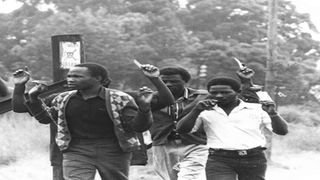
Civilians caught up in the attempted coup of August 1, 1982 walk on the streets while displaying their ID cards.
| File | Nation Media GroupNews
Premium
Abortive bombings that foiled ’82 coup
What you need to know:
- A survivor of the attempted military coup of 1982 says a few army bosses knew that the coup was coming.
- Finding a job after the detention and imprisonment has been a nightmare for all soldiers linked to the 1982 coup.
August 1, 1982 was a normal Sunday afternoon for Kenya Air Force soldiers stationed at the Nanyuki Barracks. Then at 3pm, the station’s alarm sounded and they rushed to the parade ground.
Shortly after, the war alarm sounded.
The second alarm hardly ever rang. They knew things were dire. They rushed to the armory and armed themselves. They were ordered to protect the base. Then they waited for further orders. The orders never came.
Just like that, according to the late President Daniel Moi, all the armed Kenya Air Force soldiers had “participated” in the failed 1982 coup.
Private Apollo Amieno was 24 years old. He had been at the barracks for less than two years and he still remembers the events of that fateful day that led him to the dungeons of Kamiti and Naivasha prisons for a record eight months, held incommunicado.
No charges, no court appearance, just days, stretched on end in each of the maximum-security centres. For five days, he recalls, he was locked up in a tiny waterlogged cell.
So tired was he that on the fifth night, he slept, soundly, in the murky waters of the locked cell that had the human waste and urine of previously detained soldiers accused of taking part in the botched coup.
Interestingly, a few army bosses knew that the coup was coming, Mr Apollo says.
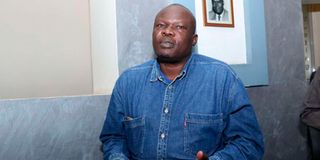
Apollo Amieno a survivor of state torture following the failed coup in 1982 during an interview at Nation Centre, Nairobi on July 21, 2021.
Now 63, the former soldier recalls that there had been word going around the previous Friday, barely two days to the coup, that something of that sort would be happening.
Several senior officers, including KAF General Jackson Mulinge, are said to have been informed of the plans. Gen Mulinge was told by his junior Maj-Gen Peter Kariuki.
The spy agency, the Special Branch, had also got intelligence about the impending coup.
However, the general instead ordered that the culprits be arrested on Monday, a day after the execution of the coup.
The Special Branch has reported the coup had been planned for August 3.
But it would emerge the coup plotters led by Senior Private Hezekiah Ochuka, an ambitious soldier based in Nairobi, and his colleagues from Laikipia Airbase, Senior Sergeant Pancras Oteyo Akumu and Lieutenant Leslie Kombo Mwamburi, had got wind of the reports their plot had leaked.
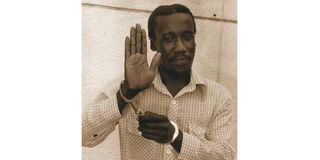
Senior Private Hezekiah Ochuka who was the ringleader of the attempted coup of 1982.
Therefore, they moved the coup to Sunday, August 1. The coup plotters knew some of the soldiers from Kenya Army were busy that weekend in military games in Lodwar.
On Friday, a meeting was called and the pilots who were supposed to offload deadly bombs on strategic places and buildings in the country in a single day were briefed. It was on this same day that Gen Mulinge was reportedly informed of the plans.
At the briefing, the soldiers were informed that three fighter jets were ready for the job. Each jet was to offload two bombs attached on each of its wings. Each bomb weighed 250 pounds.
In total, 1,500 pounds of explosives were to be fired at six specific targets: the Ruiru camp that housed the feared Recce squad, the GSU barracks, the Kahawa barracks, the Defence headquarters (D.O.D), the Lang’ata barracks, and then, the ultimate target, State House. The plan was simple, to overthrow the government.
They had banked on reports that President Moi would be away in Tripoli, Libya, attending an Organisation of Africa Union meeting. The president, however, did not go for the summit.
Come Sunday, a change of heart was registered. While meeting at around 6am to carry out the plans, a discussion began among the plotters of the coup. A few questions were asked by one pilot who doubted that they had critically considered the repercussions of their impending actions.
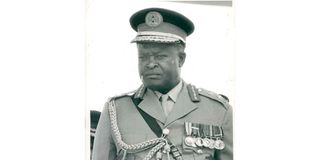
Former KAF General the late Jackson Mulinge, who is credited with crushing the attempted coup of 1982.
“Do you all not have relatives living in Nairobi? Do you know what impact these heavy bombings are going to have on our families, friends and people we know? Are we really ready for this?” These were but some of the soulful questions believed to have been asked that morning.
One by one, the charged pilots started getting cold feet. They agreed that they would abandon the plan. However, the bombs had already been mounted on the planes. A brief technical meeting revealed they could not be offloaded unless they were fired.
“It was then decided that they would fly over Nairobi and then drop the bombs on Mt Kenya,” Mr Apollo says.
But while the team in Nanyuki had doubts, their rebel colleagues in Nairobi, led by Senior Sergeant Akumu had already stormed the Voice of Kenya station (now KBC).
At the Eastleigh and Embakasi airbases gunshots rent the air at 2am. The feeling was euphoric. Rebel troops drove into the city celebrating the coup.
The broadcasting grounds would be turned into a battle ground after Kenya Army soldiers began the offensive against the rebels.
No bombings
Akumu fled to Eastleigh Airbase. Ochuka joined him later. They called their Nanyuki friends for back up. Soon, fighter planes flew over the sky but did not bomb any of the agreed places.
Desperation started creeping in, by 2pm, Ochuka and his followers knew the coup had failed.
Some junior soldiers were unaware of the plans. So when the alarms sounded, they did as trained and assembled while their colleagues dropped the bombs at their new destination.
“While armed with our weapons and waiting for further directions, our colleagues from the army side of the military came to our Nanyuki base. We talked, and agreed there was no attack happening.
They left, but they surrounded our base and started shooting,” Mr Apollo recalls.
Caught unawares, the Air Force soldiers surrendered. They were taken to one location for the night and thoroughly interrogated.
“We were put in groups identified by colours. There were teams red, yellow, white and green. The interrogations established that around 10 people had real knowledge of the coup,” Mr Apollo says.
Shortly after, though their interrogators had established that they were innocent, they were all taken to Kamiti and some to Naivasha maximum security prisons.
This did not happen at the Nanyuki air base alone. Senior Private Michael Momanyi, then 25, was stationed at the Eastleigh airbase. He recalls that they were arrested in the same manner by their army counterparts and bundled into one place for interrogation. They, too, were taken to Kamiti prison.
It was at Kamiti that Mr Amieno and Mr Momanyi met. They have been friends for the past 39 years.
Unlike Mr Amieno, who refused to accept that he played a role in the coup and was sent home eight months later, Mr Momanyi was duped, like many others, and accepted a pre-written statement saying that he took part in the coup.

Apollo Amieno (left) and Michael Momanyi survivors of state torture after the failed 1982 coup during the interview at Nation Centre, Nairobi on July 21, 2021.
“We were told by the wardens and our lawyers to accept that we just carried guns and had not intended to use them. I agreed. Later, I wish I had not,” he regrets.
He was subsequently arraigned at a court martial at Lang’ata barracks and sentenced to two years, later reduced to one year, for ‘participating’ in the coup. He served his time at Kodiaga Prison from 1983 to 1984.
“The entire court martial process was a sham. The charges were supposed to be signed by our service leader, General Mulinge, but were signed by General Mohamud Mohammed of the army,” Mr Momanyi says.
Besides that, they were presented in the court in tattered clothes, which is against the military’s dictates that soldiers attend a court martial in their ceremonial attire, known as dress number one.
“I suspect the information about the coup reached the President, who pulled his strings at the army and let it happen so that they could do away with the Kenya Air Force, which some people feared was becoming too powerful,” Mr Momanyi says.
“I do not, for one instance, believe General Mohammed’s involvement in our case was mere coincidence.”
All over the world in the 1980s, several countries, including the United States and in the Middle East and Europe, were in constant wars and their air forces had become a great way of proving superiority.
It was in 1982 that Israel launched airstrikes on Syria, causing massive damage. The constant airstrikes had become an international security affair. Governments knew the power that an air force had.
With the failed coup, President Moi was presented the opportunity to flex his muscles and tame the Kenya Air Force a little bit. He abolished it and established the 82 Air Force, which was, interestingly, headed by General Mohamud Mohammed. The first thing that the new body did was firing all the soldiers accused of engaging in the coup plans.
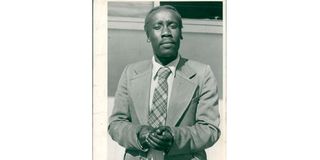
Senior Private Hezekiah Ochuka who was the ringleader of the attempted coup of 1982.
Mr Amieno, on the other hand, suffered eight months in State prisons. He had chosen to remain isolated in the waterlogged cell for five days rather than admit to crimes he had not committed. But on the sixth morning, his stance changed. This is after his body could not take any more fatigue and he slept in the filthy cell.
“I remember waking up on the sixth day in the smelly water and remembering my mother. I cried like a child. It was too much. I banged on the door and told the warden that I was ready to confess and sign the fabricated statement,” he recalls.
The guard had in the previous five days been telling him that he only had to confess and walk back home a free man and then be reinstated to work.
“You will die here. Your fellows passed through here and they are now working,” he had been told.
At exactly 7:38am, the interrogator came and the tired soldier reported he was ready to confess. At 9am, he was freed from the waterlogged cell and taken to the interrogation office and given clothes for the first time that week.
Then, a blunder occurred. The interrogator stepped out of the office and left behind a newspaper.
The headline said, “Odinga in Kampala”, but below it, another headline caught the soldier’s eyes. It read, “Peter Sapalan given 25 years”.
This would not have meant anything to Mr Amieno, but now Sapalan had been his colleague and they had been informed that he had been reinstated to work after confessing.
Refused to confess
“The government was lying to us. I refused to confess and the interrogator, sensing I had seen the article, ordered that I be taken to an isolated cell away from my unsuspecting colleagues,” he recalls.
Burning to inform his colleagues of the lie, Mr Amieno devised a way to do so despite being denied freedom to interact with his former workmates. He made up a song informing them that they were being lied to but pretended to be singing a popular hymn.
His colleagues quickly understood and spread the message. Most of them refused to accept the statement. His antics were cut short days later when the army came to guard them. He was taken back to an isolation cell.
Eight months later, in late April 1983, Mr Amieno was among the hundreds of soldiers freed and ordered to go back to their countryside homes, where they were to report to their local chiefs weekly.
Finding a job after the detention and imprisonment has been a nightmare for all soldiers linked to the 1982 coup. Especially after the government of the day told the masses that they were rebels and as such, no one wanted anything to do with them.
Luckily, the 82 Air Force was disbanded by a court ruling in 1993 and Kenya returned to the constitutionally backed Kenya Air Force.
Since 1995, the wrongfully dismissed soldiers have been in court on countless occasions demanding justice. Their efforts bore fruit 21 years later. This is after Justice Mathews Nderi Nduma of the Employment and Labour Relations Court ruled in their favour on April 15, 2016.
“It is hereby ordered that a declaration that the claimants suffered in the hands of an illegal authority called 82 Air Force which had no authority to retire, dismiss or terminate their services as the claimants had contracted their services with the Kenya Air Force authority and no other illegal establishment out of the Kenya Army Forces Act,” the ruling said.
“It is hereby declared that the claimants suffered wrongful torture, arrest, unfair trial, imprisonment and discharge from service without payment of arrears, salaries, terminal benefits and pension.”
Some 284 wrongfully discharged soldiers filed the lawsuit. Mr Apollo and Mr Momanyi are in this group. They were jointly awarded Sh4.84 billion that had accumulated interest of Sh3 billion and costs of Sh88.17 million, totalling Sh7.93 billion in compensation.
The government has appealed the ruling on several occasions and has been unsuccessful, with the latest ruling by the Court of Appeal on February 6, 2020 dismissing its appeal.
“I am not satisfied with the explanation given for the substantial delay. The court of justice must look at both sides of the road. In this case, justice of the matter is in favour of the respondents... I decline to exercise my discretion in favour of the applicant (State). The application dated March 12, 2019 is hereby dismissed with costs,” Judge M. Warsame ruled.
Despite the court’s ruling, the former soldiers have never received a single cent from the State. They have also been denied entry to their former workstations contrary to Justice Mathew’s ruling.
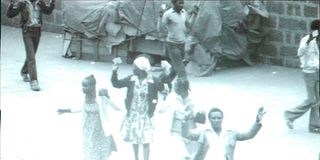
Civilians caught up in the attempted coup of August 1, 1982 walk on the streets while displaying their ID cards.
The Senate also weighed in on the plight of the soldiers and agreed with the report filed by National Security, Defence and Foreign Relations Committee, saying the ex-Kenya Air Force officers and servicemen be compensated.
“The Committee recommends that the Government of Kenya, through the Ministry of Defence, honours the court orders and immediately settles the awards due to the petitioners plus costs and interests accrued following the date of judgment as provided,” the late Garissa senator Yusuf Haji said on the Senate floor on December 3, 2019.
Still, nothing happened.
Life has been harsh to them. Mr Apollo says his children constantly asked him if the torture he suffered while in prison has been transferred to them. He has three children, two girls and one boy. They all completed their university education but are yet to find jobs.
Mr Momanyi, now a widower following his wife’s death in 2017, has two children, a boy and a girl, and both are university students.
For now, they have but one appeal to President Uhuru Kenyatta.
“Nobody has the key to our issues except the Commander in Chief of the Armed Forces, President Uhuru Kenyatta. We appeal to him as the father figure of this country to have mercy on us,” the survivors of the coup say.
“Had we received the compensation or not been discharged, we could have started a business and given our families a better life.”





